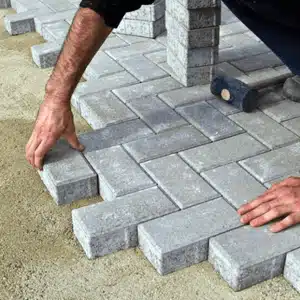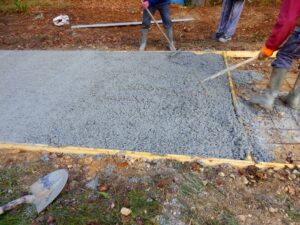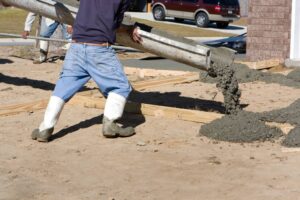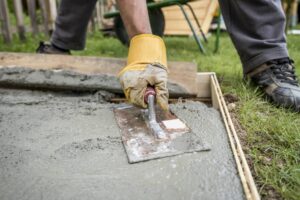How to Hire a Concrete Driveway Contractor You Can Trust
A concrete driveway is an investment in your home. In Central Texas, a concrete driveway faces intense sun, heavy rain, and vehicle traffic. Hiring the right contractor makes all the difference between a surface that lasts decades and one that cracks within years.
The best concrete contractors in Waco TX know how to handle local soil conditions and weather patterns. They provide concrete services that cover concrete driveway construction, concrete foundations, and decorative concrete finishes tailored to Waco TX properties. Because they specialize in Waco TX climate, their concrete services reinforce durability for homes, commercial buildings, and commercial concrete needs, ensuring each concrete driveway stays strong under heavy traffic while requiring minimal maintenance.
Experts in Waco TX advise on decorative concrete upgrades that boost curb appeal and value. This guide will help you identify concrete services in Waco TX you can trust for your next concrete driveway project.
Why the Right Concrete Contractor Matters

Choosing quality helps save money on repairs. A skilled team uses proven methods and materials, producing concrete work meeting industry standards and delivering exceptional results.
A concrete company will work closely with you, designing driveway that enhances curb appeal and landscape design. In McLennan County, contractors show accountability.
The right crew pours incredibly durable concrete, ready for heavy foot traffic and daily vehicles. This solid foundation guards investments for decades.
Essential Services to Look For
Not all concrete contractors offer the same services; the best handle all your concrete needs from planning to pour.
Site Preparation and Grading
Quality contractors excavate and grade so water drains off the driveway, leaving concrete on a foundation that prevents problems safely.
Installation and Repair Options
Seasoned teams handle concrete driveway replacement and concrete driveway repair in Waco TX. These waco concrete pros remove slabs and deliver concrete services, offering concrete driveway resurfacing or concrete restoration when damage is minor. Team upgrades outdoor concrete surfaces with stained concrete, decorative concrete, and stamped concrete.
Concrete resurfacing restores concrete surfaces and fixes a concrete driveway with cracks, saving money over replacement. Stamped concrete patterns boost appeal on pool decks, and waco concrete specialists refresh stamped concrete patios. For pool decks, waco concrete experts provide concrete repair, recommend concrete services, and install concrete driveway options across Waco TX, meeting concrete repair and concrete services needs in Waco TX.
Decorative and Complete Services

Beyond gray, decorative concrete options such as stamped concrete and concrete staining, stamped concrete patterns, decorative overlays, and exposed aggregate upgrade any Waco concrete surface to match any style and leave a lasting impression. Top Waco concrete contractors tackle concrete patio builds, pool decks, driveway extensions, and concrete slabs for residential upgrades and commercial work, guiding clients on other materials when appropriate.
Their experienced crews pour concrete slabs with proper reinforcement, repair larger cracks, and can resurface worn concrete slabs as a cost effective solution before suggesting a new patio. Ask for a free quote, compare the second free quote carefully, and confirm each surface finish meets residential expectations.
Plan Your Project First
Know what you want before calling contractors. Clear goals help you get accurate quotes and find the right fit.
Are you installing a new concrete driveway or replacing an existing one? If your current driveway has cracks, decide if you want concrete crack repair, partial replacement, or complete overhaul. Consider if you want standard finish or decorative options for added curb appeal.
Figure out basic dimensions and square footage. Contractors need this for accurate quotes. Standard driveways are often 4 inches thick for cars. Heavy traffic areas might need 5+ inches with rebar reinforcement. Consider drainage needs too. Central Texas sudden downpours can cause pooling without proper slopes or drain installation.
Will the driveway support heavy trucks or RVs regularly? Do you want additional parking or walkway extensions? Clear communication helps contractors plan concrete slabs that meet your needs. If you want stain resistant finishes for oil protection, ask about sealants or polished concrete options.
Check Experience and Track Record
Experience matters when choosing a concrete driveway contractor.
Years in Business and Portfolio
How long has the contractor worked with driveway concrete around Central Texas, and does an experienced team from a Waco concrete company oversee your driveway? Companies with years of practice, a skilled team, and experienced team excel at commercial concrete, driveway resurfacing, concrete patio builds, garage floors, and parking lots, serving residential and commercial clients alike. They provide free estimates that clarify scope for each surface and elevate the surface through proven concrete restoration and concrete resurfacing methods.
Ask to see concrete work samples that properly repair damage, fix cracks, and demonstrate a durable surface. Good contractors share driveway and patio photos, then invite you to inspect completed Waco projects before choosing them for your next project.
Reviews and Local Reputation

Check reviews on Google, Yelp, BBB, or Angi. High ratings from residential and commercial clients signal driveway expertise. Study comments on professionalism, timing, cleanup, and note complaints about delays, poor workmanship, or failure to repair cracks in finished concrete work.
Across Central Texas, word-of-mouth counts. Ask neighbors, friends, or Facebook groups about Waco concrete companies meeting residential and commercial needs. Reliable crews depend on referrals and a strong local reputation.
Verify Credentials and Insurance
Texas doesn't license general contractors at the state level, but cities often have requirements. Trustworthy concrete companies are transparent about credentials.
Business Registration and Insurance
Ensure the contractor's business is registered in Texas and your local municipality. Waco requires a $5,000 cement contractor bond for work on driveways and sidewalks. A bonded contractor shows professionalism and accountability.
Never hire a contractor without insurance. They need general liability insurance to cover property damage and workers' compensation for crew injuries. Ask for insurance certificates and verify the policy is active. Texas cities like Waco require minimum $300,000 insurance for registered contractors.
Certifications and Permits
Some concrete contractors in Waco TX carry extra credentials from the American Concrete Institute or specialized training in concrete staining, concrete repair, and concrete foundations. While not required, these certifications show commitment to industry best practices and prove they can handle pool decks, parking lots, commercial buildings, and residential outdoor space with decorative finishes.
Reputable concrete contractors in Waco TX also master local permitting, ensuring every project complies with codes. Before pouring driveways or expanding concrete services to stamped patios, ask which concrete services cover permits, whether they manage concrete staining upgrades, and if they provide free estimates. Detailed answers protect timelines and budgets.
Get Multiple Quotes and Compare
Cost matters in any home project. To hire a trustworthy contractor and get a fair deal, obtain multiple quotes.
Get at least three quotes to understand market rates and identify outliers. Give each contractor the same project information to create fair comparisons. Don't accept one-line estimates. Trustworthy contractors provide detailed breakdowns including materials, labor, site work, and extras.
While everyone wants to save money, extremely low bids are red flags. Going for the cheapest contractor quote no matter what is a common mistake. They might cut costs with poor materials, thin concrete, or skipped steps like expansion joints. Sometimes cheap becomes expensive through future repairs.
Compare proposed scope and quality alongside price. One contractor might cost more but include better reinforcement, thicker slabs, or longer warranties. These value-adds are worth considering.
Ask the Right Questions

Come prepared with questions when interviewing contractors. This gives you information and tests their expertise.
Ask what preparations they'll do before pouring concrete. The answer should include excavating poor soil, compacting soil, adding gravel base, and installing forms. Proper preparation is crucial for a hard foundation.
Ask how they'll reinforce concrete and prevent cracks. Knowledgeable contractors discuss control joints and reinforcement like rebar or fiber. They should mention proper water amounts in concrete mix and expansion joints where driveways meet structures.
Ask about project duration and curing time. Actual pouring might take a day or two, but site prep adds time. Proper curing means not driving on new driveways for about a week. Many contractors recommend 7 days minimum before light use.
Ask about cleanup and landscaping repairs. Installing driveways can disturb surrounding areas. Clarify if quotes include hauling away old concrete and debris. Ask about warranties on their work. Many reputable contractors offer warranties and should provide care instructions for sealing, cleaning, and curing.
Look for Professionalism
Trust builds on technical skills and overall professionalism during interactions.
Has the contractor responded to calls and emails? Do they show up on time? Good communication early indicates how they'll behave during projects. You want someone who works closely with you and stays reachable if issues arise.
Professional contractors provide written, detailed estimates and formal contracts. Avoid anyone wanting handshake deals or pressuring cash payments without paperwork. Trustworthy contractors are transparent and patient. They provide license and insurance proof without hesitation.
Good contractors tend to be busy. Don't be surprised if top-rated Waco concrete contractors can only start in weeks or months. Be wary of contractors claiming they can start tomorrow with wide-open schedules. You should never feel pressured to sign today or be told quotes expire quickly.
Secure a Detailed Contract
Once you've selected a contractor, sign a proper contract before work begins.
Contracts should clearly define all work including old driveway removal, base preparation, new concrete specifications, and finishing touches. Include start and completion dates with some flexibility for weather delays.
Never pay 100% upfront. Typical payment is a deposit of 10-30% to schedule work, then remainder in installments. Final payment comes when jobs are completed to your satisfaction. Contracts should list costs for major components and specify that additional costs require written change orders.
Check what warranty contractors provide on workmanship and materials. It might be one year on labor if concrete cracks due to improper installation. If unexpected issues arise, contracts should require written documentation of any changes with agreed cost adjustments.
Final Thoughts
Hiring a concrete driveway contractor isn't something most homeowners do often. It's worth investing time upfront to do it right. By considering credentials, quotes, and professionalism, you'll greatly increase chances of smooth projects and durable, beautiful driveways.
Remember that reliable contractors in Waco or anywhere in Central Texas will be transparent, experienced, and focused on quality. They take pride in their work and want you delighted with your new or improved driveway.
The goal is finding contractors who fit your budget and give you confidence that all your concrete needs are in capable hands. With research and careful vetting, you can look forward to successful projects that leave you with outdoor spaces that are functional, attractive, and built on solid foundations of trust and quality craftsmanship.
Your concrete driveway should serve your home for years to come, installed by contractors you'll happily recommend to others in the Waco area. Give our website a visit to schedule a driveway assessment today!


















